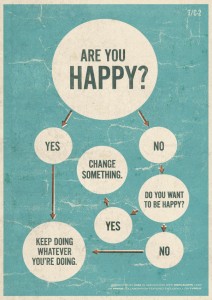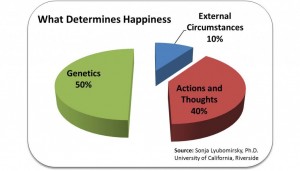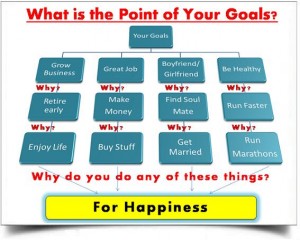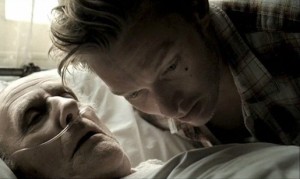20 things I wish I knew about life before I was 40
Am I really half way through my life ?
I turned 40 a couple of years ago. It was a great day and I had a great weekend celebrating with friends at an incredible house. Here I was an energetic, ‘young’ 40 year old celebrating and enjoying life – with loved ones around me, a positive future and no major regrets.
But on the inside, there was a lot more going on. For me, turning 40 was a transformational time. It was a time of self-reflection where I started asking myself some big questions and thinking about life. Thinking about who I was. Thinking about my life to date. Thinking about where I was going and what I wanted to do and achieve in life. And thinking about what I wish I’d known earlier.
Fortunately I can say that I’ve given my first 40 years a good tilt. I’ve travelled to over 25 countries, studied overseas, written 2 books, lived overseas as a professional athlete and competed at two Olympic Games. I’ve driven a team of husky dogs for 2 days in Norway, dived with Great White Sharks and am soon to ride an elephant in Africa. I’ve seen the high life during some of my investment banking days, and had a glimpse into those who live in extreme poverty (through my work as an ambassador of the Global Poverty Project and when visiting my sponsored child in remote Kenya). I’ve met famous people, powerful people, inspiring people, homeless people, ordinary people and people I wish I hadn’t ever met. I’ve seen and experienced a fair amount and learnt a lot.
But one thing I have realised with the benefit of a little bit of wisdom as I grow older is how much I don’t know and how much I wish I’d known earlier. When you’re in your 20’s and 30’s you have all this potential … but often you don’t know what to do with it or how to really leverage it. Or you think you have it all figured out but you find out later that you didn’t really.
So here’s a list of things that I wish I’d known earlier.
20 THINGS I WISH I WOULD HAVE KNOWN BEFORE I TURNED 40
1. I wish I had spent more time deciding what I really wanted from life.
Figure out your passion and purpose. Don’t wait until 30 or 40 to find that out. Chances are the guys and girls that figured it out earlier are not only doing what they love which is reward in itself, but are probably successful at it and now reaping the rewards. There’s nothing worse than feeling like you have to do something because that is all you can do and your stuck. Doing what you love is a key to life. So don’t feel the pressure to do any particular thing, or follow any particular path. It’s your life. So its worth taking the time to figure out (even in part) what you want from life, how you want it to look, what you want to do and how you want to live.
2. I wish I had drunk more water.
Observe a plant before you water it and after you water it and treat your body the same. I wish I’d drunk more water and less coke and fruit juice.
3. I wish I had had more confidence around girls.
I was always really comfortable around girls when they were friends. But the minute it was a girl I liked – things changed. And don’t even suggest to me to go up and talk to that girl in the bar ! (Even if I knew in my head that she was out with her girlfriends not only to have a fun night with them, but to meet them too). The older you get the more you realise that women appreciate being asked out in a genuine and confident way. You come to realise that if the worst that happens is a ‘no’ then that’s not really that big a deal. You also realise that women are more attracted to men who have fun and make them laugh. That our male obsession with bodies and image is less important in meeting a girl and then making her happy than we thought. (Mind you – men are still from Mars and women from Venus !) 🙂
4. I wish I had known more about food and what was truly good for me.
Can you believe it was only after competing in two Olympics that I really started educating myself on healthy goods. Understanding what foods affect me poorly eg allergies, bloating. Understanding that most labels with “Light,” “Healthy,” “Diet”, “Sugar Free” are probably just trying to cover something up. Understanding that wholefoods are good. Understanding the difference between good fats and bad fats. Understanding how good I feel when I feed my body the right fuel / foods.
5. I wish I had followed my instincts more.
I tend to over-think things. And yet, my gut instinct has been nearly always right. Listen to that knot in your gut and your intuition. Take note of that red light going off deep down inside you. If you think she might not be the right girl, she probably isn’t. Same goes for your job. Of all the voices you hear, your own may be the wisest and hardest to listen to.
6. I wish I had taken more photos.
Ever noticed how photos are one of the first things that everyone rescues from their home in an emergency. There’s a good reason for that – photos mean memories and emotions. A reminder of experiences, of community, of fun times, and of a life well-lived.
7. I wish I had started my “private” university earlier.
Robert Kiyosaki is right. We go to school but do we really get educated on the things that really matter after we finish school ? Things like financial acumen; communication skills and emotional intelligence; life skills like discovering your purpose, getting over disappointment and developing belief in yourself. I’ve learnt that self-development and personal education is so valuable. So build your personal library and read more. Listen to more podcasts and CDs in the car. Read a book a month and you’ve read 100 books in 10 years. Listen to a podcast a week and that’s 250 learnings and lessons in 5 years. Imagine what that knowledge could do for you.
8. I wish I had learned the true power of a thank you.
I’m trying to make sure I say a genuine “thankyou’ more often. To adopt an attitude of gratitude. Life is nicer this way. Hint: send a card, send a gift or write a letter to someone that deserves it today.
9. I wish I had not been “too busy” for my parents.
When you get older and life gets busier with family, work and other commitments, you only have less time for your parents and grandparents. Time is precious with them. And besides, when you realise that they’re people, just like you, it makes you realise that they’re pretty interesting, smart, and fun to be around. The older you get the more they appreciate that time with you too.
10. I wish I was less concerned with what everyone else thought about me.
Here’s eight words to remove from your vocabulary: “What will people say? What will people think?”
I wish I’d realised earlier how irrelevant other people’s opinions were to my life and to making me happy. I’ve learnt to not live by others expectations or opinions. Stay true to yourself and don’t be so concerned with what others think about you.
11. I wish I would have laughed more.
Make sure to laugh everyday. Just like children do. Learn to speak the language of “serious fun.” As it implies, get the serious stuff done … but make sure you have your share of fun and play, too.
12. I wish I would have realised that the world is “service” oriented and relationship based.
I wish I’d learnt earlier the power of serving others. From two aspects. From the selfish side, I wish I’d learnt the power of the “law of reciprocity” earlier – that is that people feel an inherent obligation to reciprocate your kind actions. But more importantly, the older you get, the more you realise that it’s not about what you get, but what you give back that really counts. And you realise that it’s the relationships you make that are the things that make life easier, better and more enjoyable.
13. I wish I’d learnt that there is a big difference between regret and disappointment.
I’ve learned this the hard way – through many disappointments. But the good part is that those disappointments came in the pursuit of my dreams and after having given it everything – like my crash in my second Olympics. In these tough times I had no regrets eating away at me, only bitter disappointment. But they’re different. And the understanding that regret and disappointment are different is so powerful because it frees you up to go after every other dream you have for your life, even if you don’t know whether it will turn out the way you want. You’ll go after these things because you understand and appreciate that twenty years from now you’ll be more disappointed by the things you didn’t do than by the things you did.
14. I wish I had been a morning person.
I’m still not a morning person, but I’m trying. It is indeed the best time of the day. The time to get things done early. Or the time for stillness and reflection. Or the time for exercise before the busyness of the day.
15. I wish I had learnt the power of language earlier.
Through my sport and NLP courses I have learnt the power of language – to effect the image we have in our mind, which affects the emotions we feel, which affects our actions. Language is far more powerful than we often give it credit for. Use it powerfully for yourself and use it powerfully to encourage and build up others not tear them down.
16. I wish I had built my network even faster.
The older you get the more you realise the power of networks, connections and relationships. Both for business and for your personal life. Surround yourself with people who have done more than you, gone further than you and inspire you. Just like the tide, you will rise or fall according to the influential people around you and the relationships you have.
17. I wish I had learnt to count to 10, recite ‘Baa baa black sheep’ or sleep on things earlier.
I’m a bit impetuous and emotional. I react quickly. As you get older you realise it is much better to be wise about what you say or email in the first instance as it is far harder to try and restore relationships or take things back later. You realise that reacting and retaliating merely escalates things and responding with a clear head rather than emotions is much wiser and will serve you better.
18. I wish I had learnt that the best things really are free.
Health. Loving relationships. Freedom. Inner peace. Purpose. It is these things that make our lives rich and make us truly happy. And they’re free. They can’t be bought and they can’t be earned. And sadly and ironically that’s the opposite of what the world teaches us.
19. I wish I had learnt that only the good feel guilty.
Bad people don’t feel guilty. Good people feel guilty because they are good and they feel they have done wrong, let somebody down or made a mistake. Good people have a conscience. So if you feel guilty that’s a good sign. In that event, recognise the guilt, put it right, learn the lesson, drop the guilt and move on.
20. I wish I had learnt that you’ll never understand everything.
I’ve learnt that the world is big and complex. That people behave oddly. That things will go unexpectedly wrong – or right. That some things just don’t make sense. That I wont be able to understand everything or figure everything out. But letting go and learning to live with the questions and the unknown can ironically help you sleep easier at night and bring a peace of mind.






























